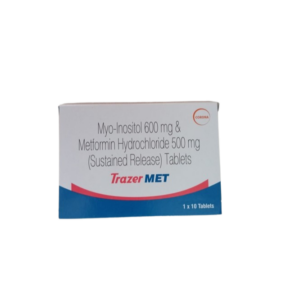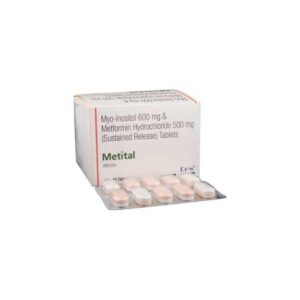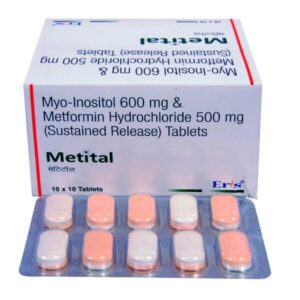METFORMIN + MYO-INOSITOL
Metformin: Metformin is a commonly used medication that belongs to the class of drugs called biguanides, which are used to treat type 2 diabetes. It is marketed under various brand names, including Glucophage, Glumetza, and Riomet.
Metformin works by reducing glucose production in the liver and increasing insulin sensitivity in the body, allowing better control of blood sugar levels. It also increases the uptake of glucose by muscle cells.
The usual starting dose of metformin for adults is 500 mg twice daily, with meals. The dosage can be gradually increased to a maximum of 2,550 mg per day, depending on the individual’s response and blood sugar levels. Extended-release formulations are also available and typically require a lower daily dosage.
Some common side effects of metformin include gastrointestinal symptoms, such as nausea, vomiting, diarrhea, and stomach discomfort. These side effects can often be reduced by taking the medication with food. Additionally, metformin may cause a metallic taste in the mouth and decreased vitamin B12 levels, which can lead to anemia if not monitored. In rare cases, it can cause lactic acidosis, a serious condition characterized by the buildup of lactic acid in the body.
Metformin is contraindicated in individuals with certain conditions, such as severe kidney or liver dysfunction. It may also interact with other medications, so it is important to inform your healthcare provider about all the medications you are currently taking.
Overall, metformin is a widely prescribed and effective medication for managing type 2 diabetes, but it should be used under the guidance of a healthcare professional, who will monitor its effectiveness and any potential side effects.
Myo-Inositol: Myo-Inositol is a naturally occurring compound found in various foods and is also available as a dietary supplement. It is a member of the B-vitamin family and has been widely used to treat conditions such as polycystic ovary syndrome (PCOS), anxiety, and depression.
In PCOS, Myo-Inositol helps regulate insulin levels and improve ovarian function. It promotes the action of insulin, reducing insulin resistance and lowering blood glucose levels. By modulating insulin levels, Myo-Inositol can also help regulate hormone levels, leading to improved menstrual regularity and fertility in women with PCOS.
The recommended dose of Myo-Inositol for PCOS is typically 2,000-4,000 mg per day, divided into two or three doses. However, dosage may vary depending on the individual and their specific condition, so it’s best to consult with a healthcare professional for personalized advice.
Myo-Inositol is generally well-tolerated, and serious side effects are rare. However, some individuals may experience mild gastrointestinal symptoms, such as nausea, bloating, or diarrhea, especially when first starting the supplement. These side effects usually subside as the body adjusts to the medication.
It’s important to note that Myo-Inositol may interact with certain medications, such as lithium, so it’s crucial to inform your healthcare provider about any medications you are currently taking before starting Myo-Inositol.
Overall, Myo-Inositol is a safe and effective supplement that can help manage PCOS symptoms, improve fertility outcomes, and potentially provide relief for anxiety and depression. However, it is always best to consult with a healthcare professional before initiating any new treatment.




